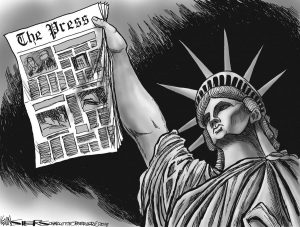The Press Against the Government
Dec 9, 2019
Freedom of speech and press has been in debate for decades, especially between journalists and the government.
Although journalists should have the right to report the truth, there should be limitations set regarding what they can report for the good of national security.
It is not new that the government is worried about the after-effects of secret information being released into the public by journalists without permission; they have the right to withhold information, and if released without consent, it is a violation of rights.
The government faces an overload of press every day; if they fail to address an issue, some journalists invade government privacy. For instance, the Pentagon Papers, top-secret information regarding U.S political and military involvement in the Vietnam War, was published without consent. Yes, journalists have the right to freedom of speech and press, but there should be boundaries in place to respect one’s privacy. For example, journalists should respect people’s decisions to withhold information, because all people have the right to stay silent. Also, journalists should be cautious when mentioning anything about an individual’s private life. In other words, no information should be obtained without consent.
According to an article written by Derigan A. Silver, Assistant Professor in the Department of Mass Communication and Journalism Studies at Denver University, it states that the 1917 Espionage Act “makes it a crime for an unauthorized person to receive national defense information or transmit it to others.”
Although many argue that this is against the First Amendment, putting the United States in danger due to the release of highly classified information can lead to large problems.
To sum it up, even if we as student journalists are not dealing with top-secret government information, it is still important to respect an individual’s privacy when publishing information. By doing so, we can create a safe school environment.






